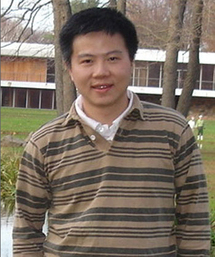Vietnam maths star prefers life in the shadows
AFP
HANOI- His work is incomprehensible to most people, but Ngo Bau Chau has been feted like a champion athlete or a pop star since last month when he won the Fields Medal, the mathematics version of the Nobel Prize.
Returning to Hanoi, Chau was welcomed like a hero -- an uncomfortable role for the French-educated academic who says he prefers life in the shadows, where mathematics had firmly kept him.

Ngo Bau Chau
"When I go to buy cigarettes, people recognise me. It's terrible", Chau says in an interview with AFP.
Official media reported 3,000 people attended a ceremony to welcome him home. The prime minister said Chau, 38, had "brought fame to the nation".
One reader of the popular VNExpress news website wrote that Chau is "like Pele of world football". On Chau's blog, another reader said that all the articles about the prizewinner seemed more like publicity "for an actor or a singer".
Chau received the award for his proof of a mathematical conundrum known as the fundamental lemma.
The International Congress of Mathematicians honoured his "profound and beautiful argument, built on insights mathematicians have contributed for over 30 years".
On its website, the group said Chau's breakthrough "removed one of the great impediments to a grand, decades-long program to uncover hidden connections between seemingly disparate areas of mathematics".
His achievement had already gained public recognition when Time magazine included it in a list of the top 10 scientific discoveries of 2009.
Chau's face still looks young. But his hair is greying and he speaks carefully, fixing his eyes on his questioner from above his spectacles.
He may have preferred working away from the limelight, but he tells AFP the prize has brought responsibilities and obligations to his homeland.
"From now on I have a heavy responsibility because I will be listened to more", he says at a coffee shop.
Chau grew up in Vietnam but made his professional breakthrough in France and is proud of his ties to both countries.
"It's as a Franco-Vietnamese that I receive this honour", he says.
Chau says he "hurried to become French" and attained his nationality in February when he felt he would win the prize. It would have been unjust had his success not also brought recognition to French mathematicians, he explains.
Chau is following the profession of his father, a mathematician who worked for the Vietnamese army until the 1980s, when he returned to academia. His mother conducts chemical research at a hospital laboratory.
Until the age of 12 Chau was enrolled in an experimental programme where "students were encouraged to have a great deal of free speech", unusual in a communist country where repetitive teaching methods and a submissive relationship persists between students and teachers.
His passion for mathematics evolved in his high school years when he was already winning international prizes.
With a grant from the French embassy in Hanoi, Chau left home in 1990 to begin university in Paris. He continued at Ecole Normale Superieure -- one of France's best post-secondary institutions -- and earned a doctorate from Paris-Sud University in 1997.
In 2004, along with Gerard Laumon, Chau earned the prestigious Clay Research Award for work on the fundamental lemma. But it needed more.
"I was at a key point in my progress. All my attempts were blocked," he says.
He left France in 2006 for the Institute for Advanced Study, an independent academic institution in Princeton, New Jersey.
Suddenly in the US, the breakthrough came.
"Everything played out in one or two weeks in December 2006. At that moment I found the missing piece of my puzzle. And I knew that I would go to the end, and prove the lemma."
Now at the University of Chicago, Chau says he plans to spend three months a year in Vietnam and open a mathematics institute under the Ministry of Education.
"One of the objectives will be to attract Vietnamese scientists to get them to come back and work in their country", he says.
"This medal, it's an incredible source of pride for Vietnamese and a formidable opportunity for the country's researchers to progress."
-----------------------------------------------------------------------